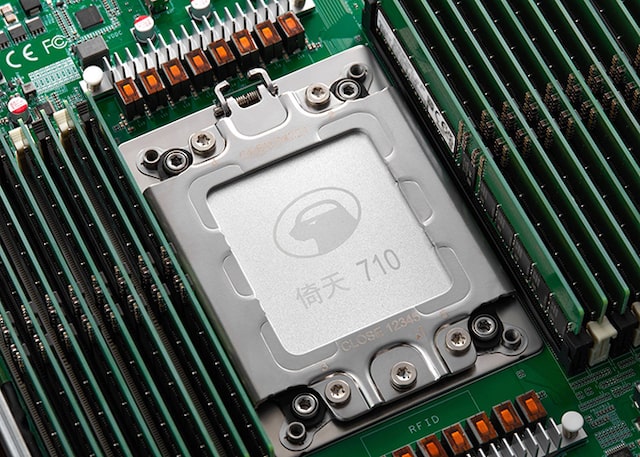
Alibaba Cloud unveiled a new in-house processor design for use in its data centers. The server chips, named Yitian 710, are custom-built by Alibaba Group’s chip development business, T-Head.
Powered by these chips, Alibaba Cloud also announced the development of its proprietary servers, called Panjiu.
Alibaba plans to use the chips to support current and future businesses across the Alibaba Group ecosystem. It will also offer its clients next-generation computing services powered by the new chip-powered servers in the near future.
Built upon advanced 5nm process technology, Yitian 710 is powered by 128 Arm cores with 3.2GHz top clock speed to deliver exceptional performance and excellent energy efficiency.
Each processor chip has 60 billion integrated transistors. Yitian 710 is the first server processor that is compatible with the latest Armv9 architecture and includes 8 DDR5 channels and 96-lane PCIe 5.0, providing high memory and I/O bandwidth.
Yitian 710 achieved a score of 440 in SPECint2017 (a standard benchmark to measure CPU integer processing power), surpassing that of the current state-of-the-art Arm server processor by 20% in performance and 50% in energy efficiency.
Panjiu was developed for the next-generation of cloud-native infrastructure. By separating computing from storage, the servers are optimized for both general-purpose and specialized AI computing, as well as high-performance storage.
With a modular design approach for large-scale data center deployment, these servers are expected to deliver exceptional economic value for a wide variety of cloud-native workloads, such as containerized applications and computed optimized workloads.
Alibaba also announced that it will open the source code of the XuanTie IP core series, among other upcoming cores. The XuanTie series is Alibaba’s custom-built processor based on RISC-V instruction-set architecture.
Developers can now access the source code of the XuanTie series IP cores on Github and Open Chip Community to build prototype chips of their own, which can be customized for IoT applications such as networking, gateway and edge servers.
In addition, XuanTie-related software stacks, which support multiple operating systems, including Linux, Android, RTOS, and Alibaba’s own AliOS, will also be opened. Alibaba will provide more services and support for development tools, SDKs and customized cores in the future.
Alibaba released its first AI inference chip Hanguang 800 in 2019. The AI chip has been deployed in Alibaba Cloud’s data centers to power businesses in areas such as search, recommendation and live streaming.
China IoT market forecast 2021-2024; Internet of Vehicles the fastest growing segment